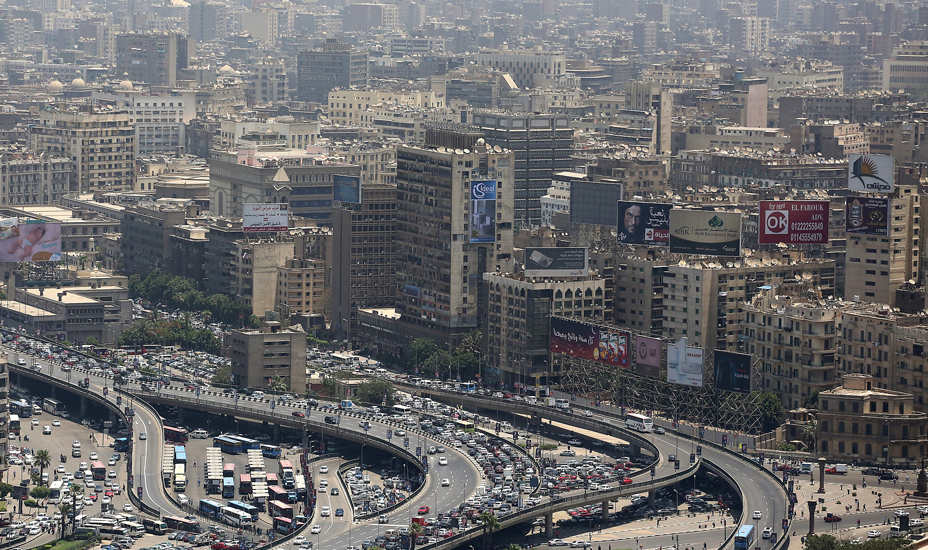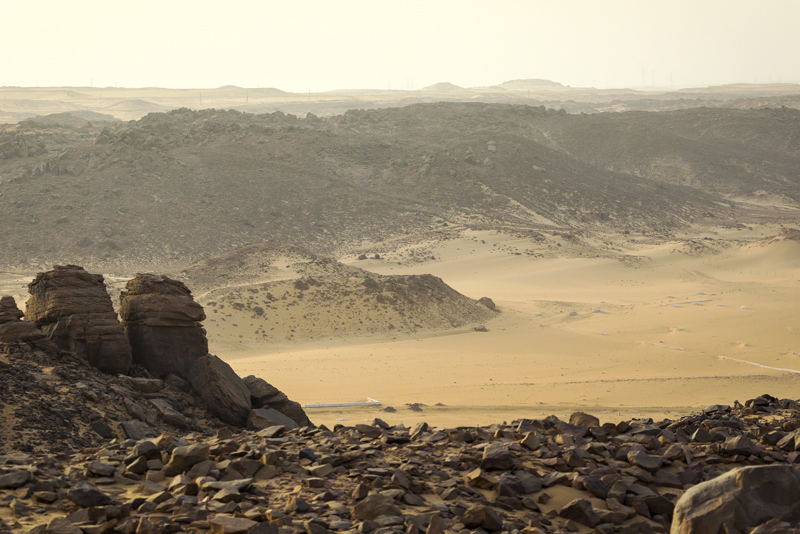
The Benban Solar Park will provide fast-growing Egypt with the clean energy it needs to drive economic growth sustainably. © Dominic Chavez/World Bank
 By Andrew Raven, IFC Communications
By Andrew Raven, IFC Communications
Few places are as barren as Egypt’s Western Desert. Save for some far-flung oases, this sprawling sea of rock and sand, roughly the size of France, has been uninhabited for millennia. But today, one 37-square-kilometer plot near the southern city of Aswan is buzzing with construction workers who are building the Benban Solar Park—soon to be the biggest solar installation in the world.
The solar park, named after a Nile River village nearby, will house 32 power plants. By mid-2019, when all the plants are scheduled to be powered up, they will be capable of churning out a combined 1,650 megawatts of electricity—enough to power hundreds of thousands of homes and businesses. That will help provide Egypt, a fast-growing country of more than 90 million, with the clean energy it needs to drive growth and fight poverty.
“This is revolutionary,” says Sunil Kulkarni, the chief executive officer of Shapoorji Pallonji, an Indian company specializing in renewable energy that is building one of the plants.
Benban’s far-reaching potential to increase Egypt’s energy generation capacity is the reason IFC and a consortium of other lenders pledged $653 million this week to support the project. The financing will help 13 private companies build and operate power plants at the site.
IFC’s loan is part of our broader effort to create a market for renewable energy in Egypt by leveraging the expertise and financial clout of the private sector.
Renewables Within Reach
Solar energy’s potential in Egypt, a country with spots known for year-round sunny days, has long intrigued investors and officials. But the high cost of solar plants has meant that for decades Egypt has relied on fossil fuels to power its towns and villages. Now that the prices of solar components are falling, allowing competition with oil- and gas-fired power plants, Egyptian officials think the nation can generate 20 percent of its power from renewable sources by 2022.
“The potential is endless,” says Lamya Youssef, the head of private sector power at the state-run Egyptian Electricity Transmission Company. “Because of the enormous increase in (Egypt’s) population, we need large investments in infrastructure, which the government cannot afford on its own. That’s why we need private sector investments.”
The Benban Solar Park will help Egypt achieve its goal—while representing a fundamental change in the way the country provides power to its people. For decades, the government has built and operated almost every power plant in the country. Until recently, in fact, the government was spending more on electricity subsidies than it was on education, health care, and social welfare combined. But three years ago, officials rolled out a World Bank Group-supported program designed to reform the power sector and encourage private companies to contribute to national growth and development.
Shapoorji Pallonji is one of those companies, with Benban being its first solar project out of India. “In many emerging markets, there is always a question about whether a project will go through,” says Kulkarni, the CEO. “But the way (this project) was carried out gave us confidence. Our experience so far has been very good.”
A Sunny Outlook on Solar
IFC spearheaded the financing package for the Benban project under its Nubian Suns program, marshalling support from a consortium that included nine international banks. The World Bank supported reforms to Egypt’s electricity sector and provided the country with a $3 billion loan. The Multilateral Investment and Guarantee Agency (MIGA), another institution of the World Bank Group, is providing $210 million worth of political risk insurance to private lenders and investors involved in the solar park.

In addition to jump-starting economic growth, the Benban project will help Egypt curb its carbon footprint. The entire complex is expected to avoid 2 million tons of greenhouse gas emissions a year, the equivalent of taking about 400,000 cars off the road.
“This project will help Egypt tap into its massive potential for solar energy and scale back its use of expensive—and polluting—fossil fuels. That’s especially important with the specter of climate change looming,” says Mouayed Makhlouf, IFC Director for the Middle East and North Africa.
The investments flowing into Benban are also creating jobs. This is vital in southern Egypt, where unemployment is rampant. More than 10,000 people will work at the site during construction and once the park is fully operational it will employ 4,000 people.
Among those who have landed work is engineer Mohamed Emara, a father of two from Cairo. He has spent three years at Benban and describes how it has dramatically improved local communities. “Many of the people on this site never had steady employment before they joined. They were day laborers. But now, they are being trained and learning skills that will help them find work on other projects,” he says.
Read more about IFC’s work in power at www.ifc.org/infrastructure.
Follow the conversation: #IFCmarkets
Published in October 2017